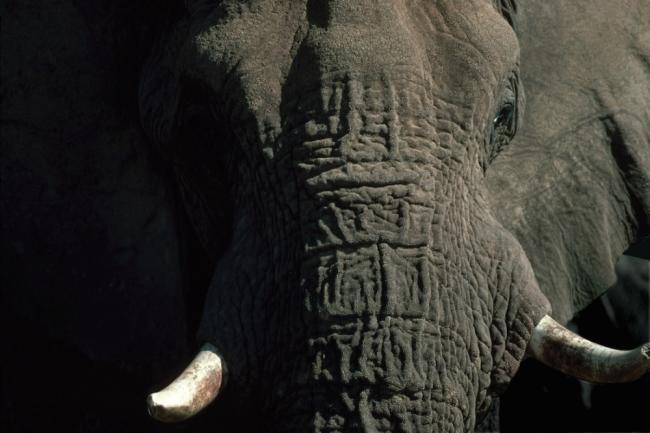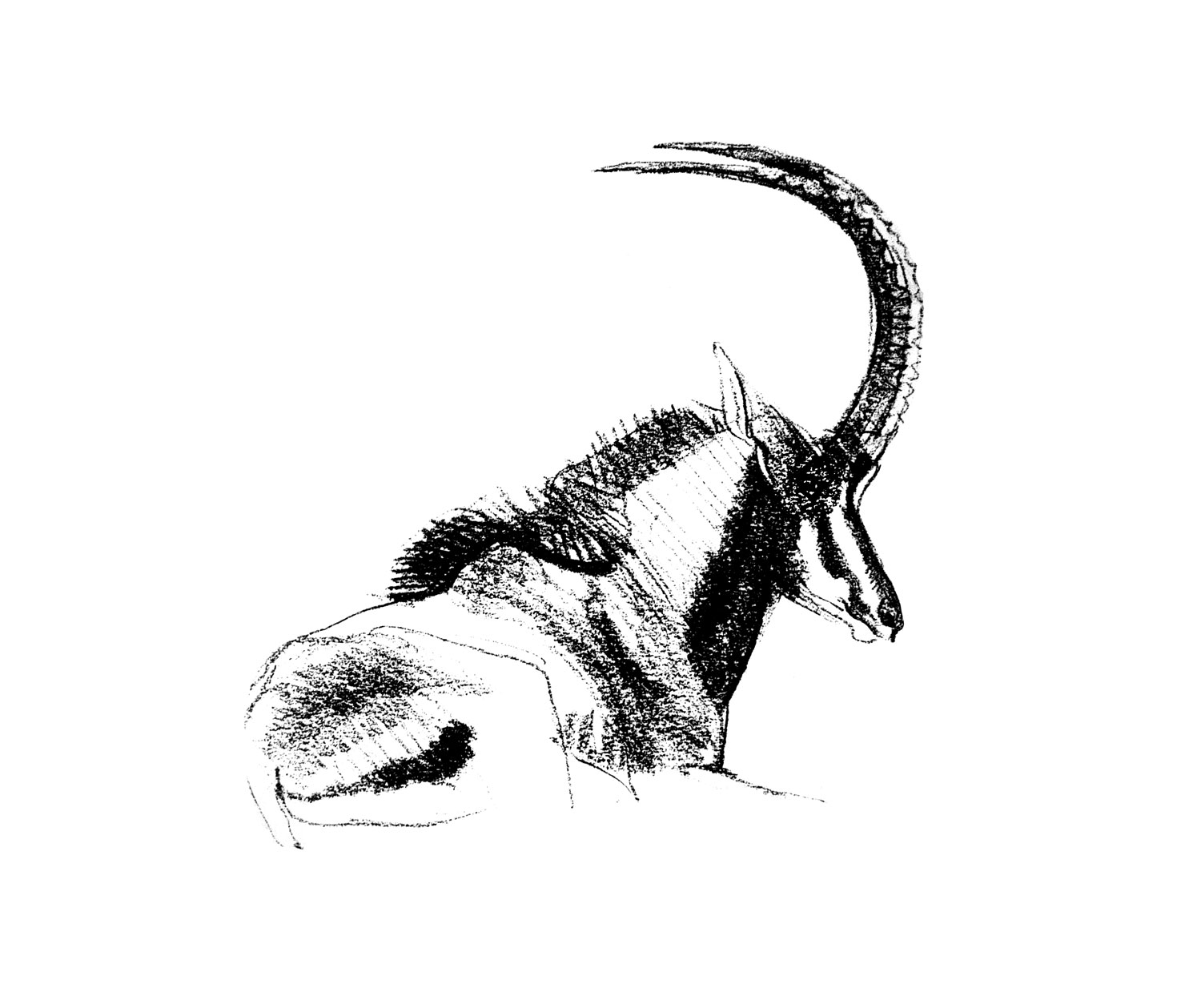Two days after the Council meeting Ezekiel sent for Gordon Stark. Gordon was a PH, the head of Nhoro Safaris, and an experienced hunter who knew elephants and how to hunt them.
He loved the place. It was his home, his sanctuary. High on the side of his mountain, he felt comfortable. He could see to the far blue horizon and the breeze always blew through the shady grove of mopane trees where he slept the day away. In this place he found relief from the heat that plagued him by day and the angry, two-legged creatures that harassed him in the lands below by night. He didn’t like to go to the lowlands any more, for he was sure to have a confrontation with them. If it weren’t for the hunger that hung flat and leaden in the pit of his stomach, he wouldn’t go, but today he was hungry and the fields of mealies called to him. They were the best thing that he’d ever eaten, and they grew plentifully around the huts where the creatures slept away the night.
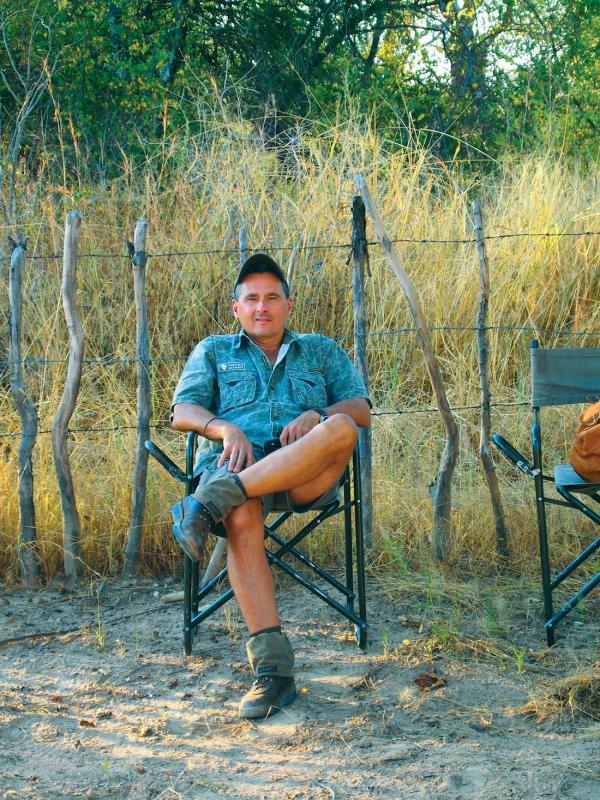
PH Gordon Stark sits next to the villager’s compound, awaiting a report on the rogue’s presence.
If he was very quiet when he slipped into the fields and kept away from the huts, he could eat his fill and return to his mountain before daylight with the comfort of a full belly. If he wasn’t quiet, though, or if others of his kind were in the field and made too much noise, things were not good.
Sometimes the creatures would hear him and run from their huts, screaming and throwing rocks. Sometimes they carried fire. And he hated fire. When he was young, the bush had caught fire after a summer rainstorm, and he and his family had raced away to avoid the flames. He lost track of them in the panic and never saw them again. Sometimes, the creatures carried long sticks that roared and spit fire and caused a hurt like nothing he had ever felt.
He wasn’t very old as elephants go, but he could remember when the flatlands were filled with uninterrupted bush that stretched as far as the big river and beyond. There were no mud huts in those days. No creatures. No fields of mealies. In those days, he roamed the bush at will and not even the lions would dare to challenge him. The two-legged creatures were different. They settled into the bush in singles and groups and made little hives of mud and sticks where they lived and guarded the land around them as if it were theirs, and only they could have the food that grew there. And they caused pain.
Once when he went to the fields, a group of them had hidden in ambush and their sticks had made a strange noise like the ripping of a long peal of thunder that pulsed, with pops coming so fast that they sounded almost like a single, drawn-out noise, and he could feel something slap his side with each pop and blood ran down his flank as he ran without stopping to his refuge on the mountain.
The wounds were not serious, but they took a long time to heal and he didn’t go to the lowland fields for a while after that. He felt weak and it hurt where he had felt the slaps, and he would rather avoid the creatures altogether if he could.
In time, he returned to the lowlands. He needed the nourishment, and the mealies made him stronger. With experience, he found a way to deal with them. They were thin-skinned and fragile, and a single swipe of his trunk would disable one of them. Then he could step on the creature and it would stop moving. But he knew that the best way to deal with them was to avoid them altogether, and if he couldn’t, he would rush them, catching them off guard before they could hurt him. He learned to circle a field and try to smell the creatures on the breeze. If he discovered that one was there but not close, he would simply slip back into the forest and go to another field. If it was close enough to pose a threat, however, he would charge instantly and furiously, and when he had taken care of the pesky thing, he could feed in peace.
He truly hated the two-legged creatures. There was an absolute infestation of the things. Another time, on his way back to the mountain, he had come across a group of small ones sitting cross-legged in rows in front of one of their buildings, and scattered them in terror when he charged into their midst. How they screamed! He had thrown back his head and trumpeted as they scattered from the schoolyard like leaves before a storm. He could show the puny things who was the biggest, most fearsome creature around!
Sometimes when he had been to the fields, the creatures tried to follow him, but they were slow and noisy and weak and tired easily. When he discovered that he was being followed, he would just walk away from them until they stopped. Sometimes it took a day or two or even three, but as long as he walked, they couldn’t catch up to him and he was safe. When they gave up, he would circle back to his refuge on the mountain. Until the next time.
Several miles from the mountain, Ezekiel had a small house in the flatlands. It was a real house, befitting a chief, and not a stick-and-mud rondavel like most of his people had. He was there on the morning when he first got word that the elephant bull with the bad attitude had returned. It had recently killed — perhaps for the second time, but Ezekiel wasn’t sure because it was hard to be certain about such things as the identity of an elephant.
“Where?”
“Was it the big one with the askari? Or the smaller one that walks alone? How did he make the kill? Which direction did he go when he was done?”
When he had gathered all the details that the messenger could give, Ezekiel made a cup of coffee and pondered the matter for a while before summoning the Tribal Council. He knew that it was a formality, but it was a necessary one. The Council would agree with whatever he recommended, but he needed to be mindful of the politics.
He hated to do it. No one knew how he hated it, but he was old and he had lived here for a long time. Since before the flood of settlers. Since before the battle over precious resources brought the people and the elephants into constant conflict. In those days, seldom did an elephant kill. He often wondered if things weren’t better then than now, but this was now and that couldn’t be changed and the stake was no less than the lives of the children. And the lives of their parents. And it must be done.

The village has been harassed by a rogue elephant for some time.
Two days after the Council meeting Ezekiel sent for Gordon Stark. Gordon was a PH, the head of Nhoro Safaris, and an experienced hunter who knew elephants and how to hunt them. Gordon also knew the area intimately, having hunted it for years, and had clients who could legally kill elephants on non-trophy permits. They brought big guns that could deal with the animals, unlike the ineffectual AKs used by the poachers and even some of the game people. Over the years Gordon and his clients had killed many elephants and Ezekiel knew that he could be relied upon to solve the problem.
“Would you kill an elephant for us, Gordon?”
Half a world away, I was laying out clothes for an extended stay in Africa when the email came. Gordon and I had made plans a year earlier for me to spend an entire hunting season with him, to travel from South Africa to Zimbabwe and back to South Africa before finishing out the season in Mozambique. I’d get to hunt along the way, and hopefully, with the extended time, I would have enough material to build a book chronicling a season in the life of a PH.
The text of the email was simple: ”Want to try for an elephant again while you’re here?”
“Whatcha got?”
“We’ve got reports of another bad one in the same area that we hunted the last year. Don’t know for sure that it’s the same one, but it might be.
“Lets give it a try.”
“Bring your .416 and this one’s yours. I’ve got a couple of clients coming in—a Frenchman and one of the guys you met in Vegas. They’ll hunt first, and they’ve both invited you to do a ride-along with them if you want to. Then you’re up.”
“Deal.”
In a few days I was on my way, following my own well-worn tracks from home to the Atlanta airport where I jumped a Delta flight to Johannesburg and overnighted there before catching a South African Air flight to Victoria Falls. As expected, Gordon was waiting there, and as soon as we had the obligatory beer at Stanley’s Bar, we headed for his elephant camp on the banks of the Zambezi.
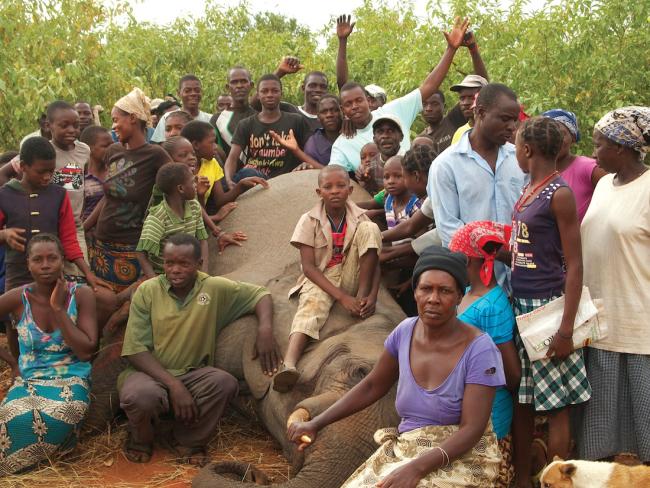
In just a few short hours these villagers from the settlement reduced the author’s rogue elephant to a matter of bones.
A couple of weeks later the two clients had gone, both having killed without incident other than a momentary fright when one big bull’s askari circled our little group and slipped in from the side. It was clear that he briefly considered the idea of a surprise flank attack, but thought better of the idea once the shooting started. When the clients left, Gordon and I turned our attention to the small bull with the bad attitude.
Ezekiel “put the word out” and the bull was located within a couple of days. Scouts found his tracks in the cornfields adjacent to a trio of huts in the general area where we had tracked a big bull the year before.
We decided to check out the reports, and when we arrived in the area the local residents briefed us on the habits of a small bull that rarely came in daylight and was known for striking first. He had no reservations about charging humans and frequently did so without warning.
The next evening the elephant woke early. The moon was high and the sun was low, and some thing, some unknown force compelled him to begin his downward trek a little earlier than usual. He took a trail that he seldom used, one that pitched steeply off the ridge and switch-backed through a series of small canyons. Like Kafka’s famous “maus,” he chose to make his way slowly up one canyon where the rock walls narrowed progressively around him and then down another where the trail crossed a small stony hill and opened into a little valley with several fields. One of them was a small circular planting of mealies that looped around a small grove of trees in the middle. In the dimming light, the trees would shield him from the eyes of the two-legged creatures that lived in the tiny group of huts on the far end.
About the same time, we were preparing our gear to go back to the area when word came that the bull had made a rare dusk appearance, and that we should hurry. Ezekiel magically appeared at the cruiser with the compulsory government game scout and a couple of trackers. We made it there in a little over an hour but darkness had fallen in the meantime. Another pair of trackers from the village joined us as we circled to the downwind side of a small field, moving past a couple of huts on a well-worn trail that ran along a finger of trees to another group of dwellings where a frightened young fellow met us in the yard.
In a whisper, the fellow told us that the bull was only 50 or 60 yards away on the other side of a small island of trees in the middle of the field. Since the wind was blowing directly from the trees, we held a hushed confab and rechecked our guns and gear, while the villagers fell back to the shadow of the huts.
Visibility was not an issue, as the night was clear and the moon was nearly full. We could clearly see the small copse of trees that gave us cover as we closed the distance, slipping carefully among the standing stalks. Our approach worked almost too well. When we cleared the trees and saw the elephant, we were far too close for comfort. His head was erect, his trunk was testing the wind, and we were only yards away.
In the instant I saw him, his head came down and Ezekiel’s light flashed on and we all experienced the strange phenomenon that human nervous systems do when it’s impossible to move fast enough, and senses go into hyper-speed and everything external seems to slow down. The world went into slow motion. We were facing each other at hand-shaking distance and the bull had already begun to make his move. My focus narrowed to a tiny tunnel, and I could see only the massive disembodied head floating in the air above me. All thought of zygomatic arches and earholes and conventional guides to shot placement disappeared and were replaced with instinctive, gut feelings of where the tiny brain should be located inside the pitching, 50-gallon-drum-sized head.
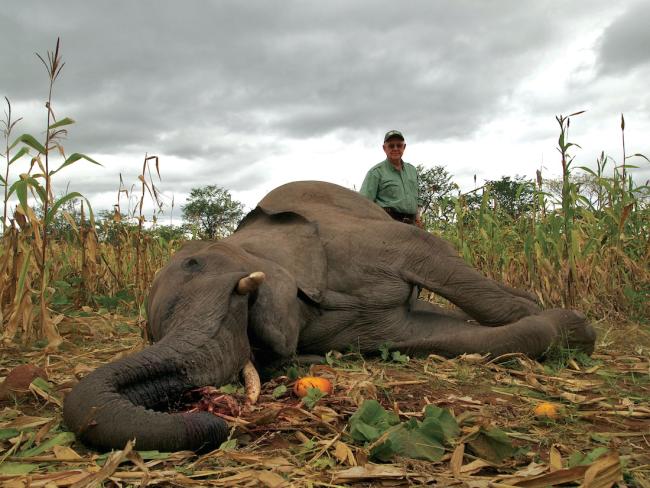
The author killed the dangerous young rogue during an exciting nighttime encounter when the bull returned to feed in the native’s maize field.
By any measure the shot was ill-placed. It simply couldn’t have ended up where it needed to be, but somehow it did, because in the same moment that his head started forward, the shot broke of its own accord and his hind end collapsed, snatching his head back and up, pitching his trunk high into the air. And when he lay still, the only thing that mattered was the number 8. It was the number of paces from the toe of my boot to the tip of his trunk.
The next morning, as the crowd was gathering for a ration of meat, I ran my hand along his side and felt his wounds and the scars where someone had “stitched him up” with an ineffectual weapon. Later, I held in my hand the puny projectile from an AK47 that we dug from the side of his skull, and wondered how all this could be.
A few miles away, and a couple of miles down a dusty footpath from the church at Chakapuleza, Hope wept when she heard that the elephant was dead. She lived in the bush, and one of the elephants had killed her husband the year before and white men had come to kill the elephant, but failed. She couldn’t know that it was the one, but it might be and she hated the elephants and cried when she heard that any elephant was killed—that retribution had been exacted from any one of their kind. The elephants had taken her husband and taken the mealies while the specter of hunger stalked her and her child. When the tears stopped, she prayed, as she often did. She prayed for divine help and she prayed for the souls of the dead and for mercy upon all creatures except the elephants. And she asked God for forgiveness, but she could not pray for the elephants.
Editor’s Note: This harrowing story, and many others like it, can be found in Africa: 41 Adventures From The Dark Continent, available for purchase in the Sporting Classics Store.
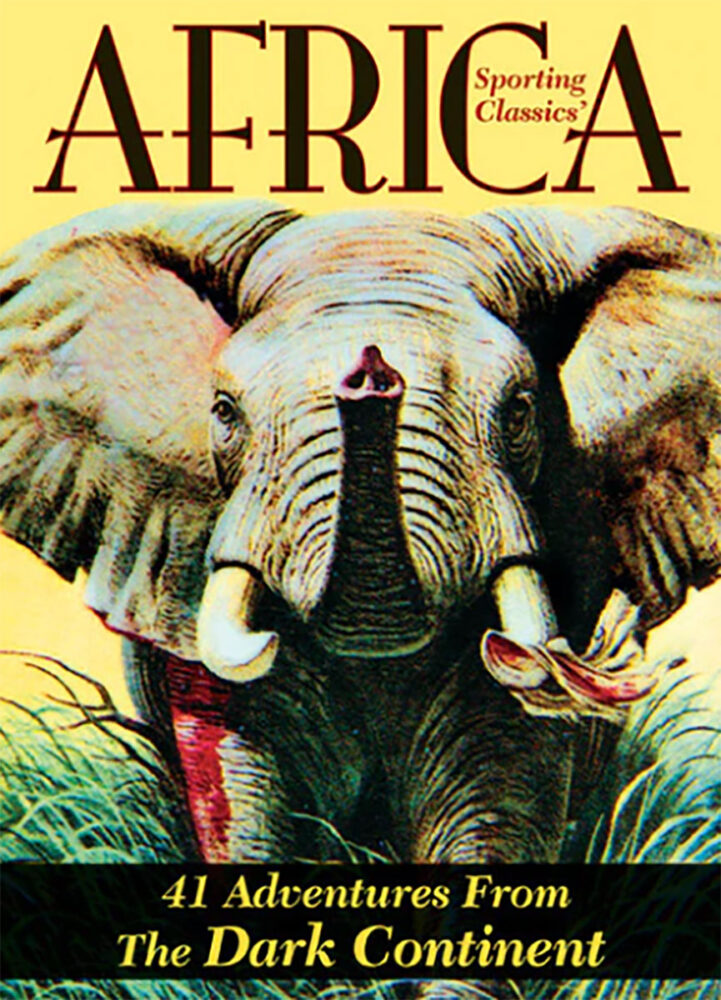 Featuring over 50 illustrations by world-renowned artist Bob Kuhn, AFRICA features more than 400 pages of unforgettable stories by some of the finest professional hunters and writers of sporting adventure.
Featuring over 50 illustrations by world-renowned artist Bob Kuhn, AFRICA features more than 400 pages of unforgettable stories by some of the finest professional hunters and writers of sporting adventure.
Over the past three decades Sporting Classics has published more than 100 articles and columns on sport and wildlife conservation in Africa. This anthology, which commemorates the magazine’s 30th anniversary, features the best of those stories. Many talented, dedicated people made this book possible, particularly the authors who eagerly shared their stories.
Driven by the hunter’s passion to look into the eyes of a cape buffalo, follow the tracks of a bull elephant, or match wits with one of the great cats, some of our greatest writers have chronicled what Africa was to them. Buy Now

